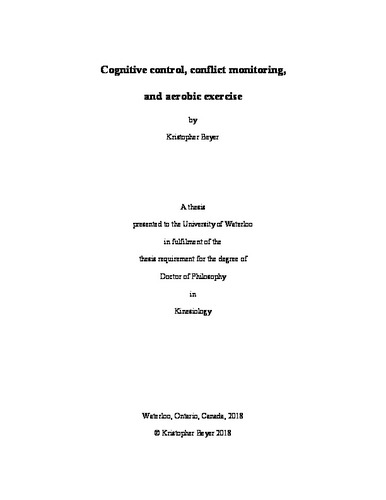| dc.contributor.author | Beyer, Kristopher | |
| dc.date.accessioned | 2018-05-01 13:17:19 (GMT) | |
| dc.date.available | 2018-05-01 13:17:19 (GMT) | |
| dc.date.issued | 2018-05-01 | |
| dc.date.submitted | 2018-04-26 | |
| dc.identifier.uri | http://hdl.handle.net/10012/13217 | |
| dc.description.abstract | Cognitive control includes a subset of top-down cognitive functions that allow flexible goal-directed behaviour that are often impaired in people with mental illness and in older adults. Even in healthy individuals, cognitive control ability is an important determinant of work and school success, physical health, and overall quality of life. Fortunately, modifiable lifestyle factors, including physical activity, may improve cognitive control in both healthy and impaired individuals. In particular, aerobic exercise benefits many types of cognitive function and may have its greatest impact on cognitive control – both after long-term training and even after a single session. The overall objective of this dissertation was to examine whether a single session of aerobic exercise impacts the ability of cognitive control to resolve conflict during choice reaction tasks. The dissertation examined the influence of a single session of aerobic exercise on behavioural performance and electroencephalography (EEG) markers of conflict measured during the flanker task – a choice reaction task that introduces conflict into information processing by including irrelevant distractor stimuli that may be congruent or incongruent with the target stimulus. A subset of this data was used to examine the relationship between behavioural and EEG markers of conflict during the flanker task. Behaviourally, aerobic exercise did not influence response accuracy or reaction time, but it reduced movement time. Aerobic exercise also did not influence the amplitude of the error-related negativity (ERN) or correct-related negativity (CRN) – EEG measures of brain activity related to monitoring conflict caused by error commission or flanker congruence. Across all exercise studies, aerobic exercise did not influence behavioural or EEG markers of conflict suggesting that previously observed exercise-induced performance improvements may be due to faster movement rather than enhanced cognitive control. Closer examination of the CRN as a measure of conflict-related brain activity, however, indicated that it was not influenced by flanker congruence, nor was it associated with conflict-related changes in behaviour, demonstrating the need to further examine the role of the CRN in information processing. The accumulation of findings within this dissertation do not support a beneficial impact of aerobic exercise on the ability of cognitive control to resolve conflict during choice reaction tasks; however, this work also highlights the need to examine methodological shortcomings and differences between studies when assessing the influence of aerobic exercise on cognitive function. | en |
| dc.language.iso | en | en |
| dc.publisher | University of Waterloo | en |
| dc.subject | cognitive control | en |
| dc.subject | conflict | en |
| dc.subject | aerobic exercise | en |
| dc.subject | electroencephalography | en |
| dc.subject | reaction time | en |
| dc.title | Cognitive control, conflict monitoring, and aerobic exercise. | en |
| dc.type | Doctoral Thesis | en |
| dc.pending | false | |
| uws-etd.degree.department | Kinesiology | en |
| uws-etd.degree.discipline | Kinesiology | en |
| uws-etd.degree.grantor | University of Waterloo | en |
| uws-etd.degree | Doctor of Philosophy | en |
| uws.contributor.advisor | McIlroy, William | |
| uws.contributor.affiliation1 | Faculty of Applied Health Sciences | en |
| uws.published.city | Waterloo | en |
| uws.published.country | Canada | en |
| uws.published.province | Ontario | en |
| uws.typeOfResource | Text | en |
| uws.peerReviewStatus | Unreviewed | en |
| uws.scholarLevel | Graduate | en |

